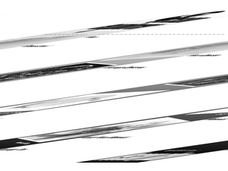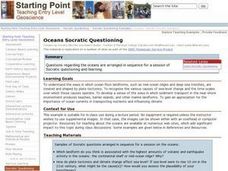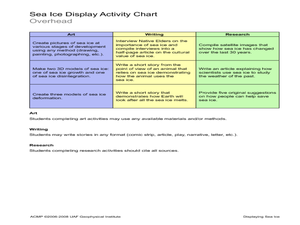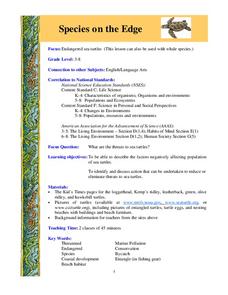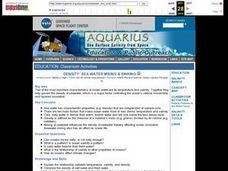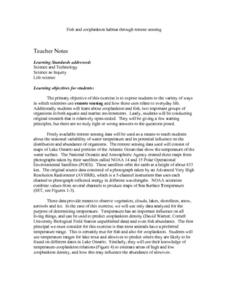Curated OER
What Was for Dinner?
Students examine energy obtaining strategies that are used by organisms in deep reef communities. For this ocean lesson students complete an isotope activity.
Curated OER
To See or Not to See
Students identify and discuss key factors that determine how effective color camouflage is in certain habitats. For this investigative lesson students divide into groups and study light.
Curated OER
Where's the Oxygen?
High schoolers study seawater and how temperature and salinity influence it. In this oxygen lesson students complete a lab activity on dissolved oxygen.
Curated OER
Oceans Socratic Questioning
High schoolers participate in a whole class discussion of ocean-floor structures and plate tectonics. They respond to prompts in a structured sequence that lead them to conclusions about the role of plate tectonics in the creation of...
Curated OER
Displaying Sea Ice
Learners display their knowledge of sea ice. In this earth science lesson, students create displays reflecting their understanding of sea ice.Learners research the development of sea ice on a variety of bodies of...
Curated OER
Predators Among Us
Young scholars study environmental science. In this ecosystems activity, students discover how humans have an impact on life in the coral reef. They watch video clips and work on small group activities. This activity includes links to...
Curated OER
Mazes
In this mazes worksheet, students configure the most efficient way to help a marine iguana through a maze find some rock weed to browse on.
Curated OER
Species on the Edge
Learners examine sea turtles. In this endangered species lesson, students analyze sea turtle habitats. Learners hypothesize why sea turtles could go extinct.
Curated OER
Big Fleas Have Little Fleas!
Students study seamounts and learn the importance of structures to species. In this ocean explorer instructional activity, students participate in an activity that teaches them how to modify a seamount so that they are more suitable...
Curated OER
My Friend, The Volcano
Young scholars describe the positive impacts of volcanic activity on marine ecosystems. In this volcano lesson students explore the process that causes volcanic activity along the Mariana and Kermadec Island Arcs.
Curated OER
What Does it Take to be a Survivor: Part 2
Students explore adaptation by completing worksheets. For this fish anatomy lesson, students identify the different survival strategies fish utilize to live in the ocean and the adaptation their bodies have gone through over millions of...
Curated OER
The Coast is Clear
In this environmental worksheet, young scholars become aware of the animals that inhabit the sea coast by reading a paragraph and coloring the picture. Students learn the importance of keeping beaches clean.
Curated OER
Keep it Complex
Students consider the importance of biodiversity in the ocean layers. In this oceanography lesson, students use the Shannon-Weaver diversity index to analyze data. Students analyze the information collected and write a report...
Curated OER
Living With the Heat: The Ring of Fire
Students investigate the planet Earth's infamous ring of fire and the life that thrives from it. In this ocean environment lesson plan, students investigate hydrothermal vents and how organisms thrive off their heat. Students...
Curated OER
Create an Underwater Scene
Students apply knowledge of underwater ocean life by creating an ocean life scene with marine animals and plants placed at appropriate ocean depths.
Curated OER
Creative Writing - I AM A FISH
Ninth graders write a letter to the editor about the impact of people on marine life from the point of view of a fish.
Curated OER
Seashore Limitations
Students demonstrate the movements and behaviors of creatures from different parts of the ocean.
Curated OER
The Magic School Bus Goes to Mussel Beach
Learners participate in a hands-on activity where they explore tidal zones. They explore tides and marine life. This is an experiment that can be accomplished in class.
Curated OER
Wildlife
First, biology pupils research land and marine habitats along the route of skipper Rich Wilson's Great American II. Then, using colored paper clips scattered across a colored paper background, they play the predator-prey game to...
NOAA
El Niño
El Nino, La Nina ... and the Santa Maria? The 11th installment of a 23-part NOAA Enrichment in Marine sciences and Oceanography (NEMO) program explains the mechanism of El Nino/Southern Oscillation. Pupils use previous data to determine...
Curated OER
Sea Water Mixing and Sinking
Middle schoolers investigate the role of temperature and salinity in determining seawater density. They use a Temperature-Salinity Diagram to examine the effects of mixing on density.
Curated OER
Fish and zooplankton habitat through remote sensing
Students are exposed to the variety of ways in which scientist use remote sensing and it used in everyday life. They investigate about zooplankton and fish. Students list the two important groups of organisms in both aquatic and marine...
Curated OER
Where's Dinner?
Upcoming marine biologists consider a list of organisms residing near the Lost City hydrothermal vents and construct a food web. They compare the food web to that of a cold seep community, of which they should have previous knowledge....
Curated OER
Light Stick Chemistry
In groups of three with the lights off and the shades drawn, investigators place inactivated light sticks, in three beakers: one filled with ice water, another with lukewarm water, and the other with room temperature water. They wait...



